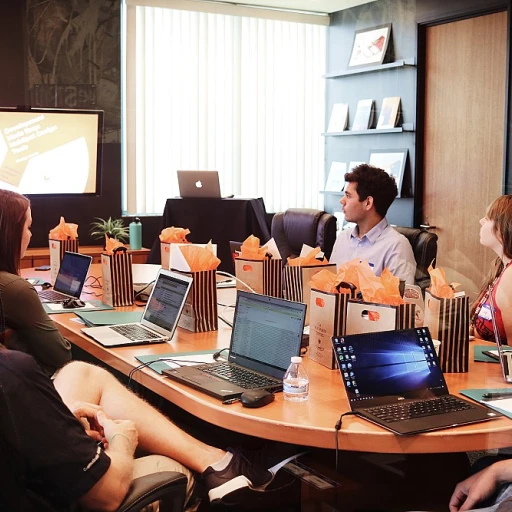
Understanding the Need for Reskilling
Reskilling: Bridging the Skills Gap
As the job landscape rapidly evolves, understanding the need for reskilling has become crucial for those looking to enhance their career prospects in Charlotte and beyond. The shift towards technological advancements and automation has led to a growing demand for new skills. This dynamic change underscores the necessity for individuals to adapt to stay relevant in the workforce.
Reskilling involves learning new skills or training for a different job to meet the current market demands. This process is not just beneficial for individuals; it also strengthens the local economy by creating a more competent workforce. Programs focusing on skill development enhance employability, facilitating better job opportunities in the city.
Charlotte is a city with a vibrant economy, attracting job seekers from various sectors. However, staying competitive requires continuous skill enhancement. For young people, students, and even those in mid-career stages, reskilling offers a pathway to career advancement. Local initiatives, such as those provided by the effective reskilling strategies, focus on equipping the workforce with necessary skills like leadership, communication, and technological proficiency.
The community, through partnerships with programs like Central Piedmont Community College and development boards, plays an instrumental role in providing essential resources. Organizations such as NCWorks Career Centers and various career development services offer workforce development support, making programs accessible for job seekers.
Overall, understanding and engaging in reskilling efforts is vital for aligning with the evolving economic trends of Charlotte Mecklenburg and beyond. Embracing these opportunities ensures that individuals are not only prepared for current employment demands but are also able to thrive in the future job market.
The Charlotte Job Market: A Closer Look
Examining the Dynamics of Local Employment
The Charlotte job market is a vibrant and evolving landscape, marked by a diverse array of industries and employment opportunities. With the city of Charlotte experiencing significant growth, both in terms of population and economic expansion, it's essential to understand the career prospects and challenges that exist within this urban hub. Charlotte stands out as a bustling center for finance, technology, healthcare, and skilled trades. This diverse mix of industries demands a workforce equipped with the necessary skills and flexibility to adapt to changing job requirements. Workforce development programs play a crucial role in equipping job seekers with the required expertise, enabling them to seize opportunities in these dynamic sectors. For young people and high school students entering the workforce, education and training form the cornerstone of career readiness. Central Piedmont offers various training programs that cater to these individuals, providing them with the foundational skills needed for successful career trajectories. The offerings by career centers such as NCWorks Career Center also contribute significantly, providing critical resources, services, and guidance in skill development and job search efforts. Community service initiatives in Charlotte Mecklenburg seek to enhance employment prospects by addressing specific needs. They focus not only on technical skills but also on intangible skills which are vital for workforce success. Unlocking the power of these skills can lead to effective reskilling in this ever-evolving job market. It's important to note the role of career development programs designed to cater to various demographics, from young students to those seeking mid-career transitions. These programs emphasize on language skills, working smart principles, and practical readiness training to meet the employment demands of the city. The Charlotte Development Board, in collaboration with various job training initiatives, ensures that both individuals and the broader community continue to thrive. By bridging the gap between education and employment, these strategic efforts lay the groundwork for a resilient and adaptable workforce, prepared to meet the challenges of today and tomorrow.Key Employability Skills for Charlotte's Workforce
Boosting the Competencies That Matter
In the city of Charlotte, strengthening key employability skills has become crucial for those aiming to secure a foothold in today's fast-evolving job market. As economic demands pivot and new sectors emerge, the workforce must adapt by focusing on both technical and soft skills that employers prioritize. This section delves into the core competencies that are essential for Charlotte's workforce, particularly as industries grow and change. Understanding the right combination of skills can significantly increase employment opportunities. Job seekers in Charlotte are increasingly focusing on skill sets that align with the industries thriving in the city Mecklenburg County area. Industries such as skilled trades, information technology, and financial services require a workforce equipped with both specialized and general skills.- Technical Skills: With the growth of sectors like technology and skilled trades in Charlotte, having specific technical skills is paramount. Training programs in the city are tailored to meet these demands, offering courses that hone in-demand skills such as data analysis, coding, and machine operation.
- Soft Skills: Equally important are soft skills, which include effective communication, leadership, adaptability, and problem-solving. These skills are universally sought after and are a primary focus in numerous training programs, including the "Working Smart" initiative backed by the community.
Effective Reskilling Strategies
Practical Strategies for Building Skills
In the dynamic job market of Charlotte, it's crucial to align one's career objectives with the opportunities available. Developing a tailored approach to reskilling will enhance employability and set individuals on a path to success.- Career-Focused Training Programs: Charlotte offers various training programs tailored to today's workforce needs. These include skilled trades, IT, and healthcare. Exploring options that match one's interests can lead to fruitful career shifts. Programs at institutions like Central Piedmont provide practical skills that align with the city's evolving industries.
- Utilizing Community Resources: There are abundant resources available in Charlotte to support career development. The Charlotte Mecklenburg Library, NCWorks Career Centers, and Mecklenburg County career centers offer invaluable services. These centers provide career readiness training and job search support, crucial for those entering or transitioning in the job market.
- Language and Soft Skills Development: While technical skills are vital, soft skills like communication and adaptability are equally important. Training initiatives such as "Working Smart" equip participants with essential interpersonal skills that employers value. This enhances both personal and professional development.
- Online and Hybrid Learning: The shift towards digital learning platforms offers flexibility for those balancing work, study, and family. Online courses can support continuous learning, with popular subjects being data analysis, project management, and digital marketing. These are essential for adapting to contemporary employment demands.
- Youth and High School Programs: Preparing the young workforce for future demands is critical. Skill development programs tailored for high school students and young people ensure they are career-ready. Initiatives aimed at youth facilitate early engagement with the career development process.
Overcoming Challenges in Reskilling
Facing Reskilling Challenges Head-On
For many individuals in Charlotte and beyond, the journey towards enhancing employability skills can be daunting. Amidst ever-changing job market conditions, it is vital to adopt effective strategies to overcome reskilling challenges. The city's dynamic and diverse workforce often finds itself navigating several obstacles.
One primary challenge is identifying the right career path amidst a myriad of options. Finding a suitable job that aligns with one's newly acquired skills is not always easy. Fortunately, career centers like NCWorks Career and Charlotte-Mecklenburg offer tailored job search services to guide individuals through this process. These resources aim to bridge the gap between skills and employment opportunities in skilled trades and other sectors.
Language barriers can also impede progress, particularly for job seekers whose primary language is not English. Training programs in the community provide language development services to ensure every participant can effectively communicate in the workplace. This added skill eases their transition into job roles, contributing to their career readiness.
The cost and time commitment involved in reskilling endeavors often present another major hurdle, especially for young people and students. Thankfully, Charlotte offers a variety of career development programs accessible at Central Piedmont and other educational institutions. These programs, often supported by the workforce development board, provide accessible and affordable options for participants looking to elevate their journey.
Lastly, overcoming the lack of career guidance and mentorship can be pivotal in reskilling success. The city recognizes this need and has established mentorship services within career centers and development programs to bolster support for all job seekers. These mentorship opportunities not only guide individuals through their training programs but also help them build valuable networks within their chosen fields.
By addressing these challenges with targeted strategies and available community resources, Charlotte can continue to support its workforce and create a more dynamic and inclusive employment landscape.













